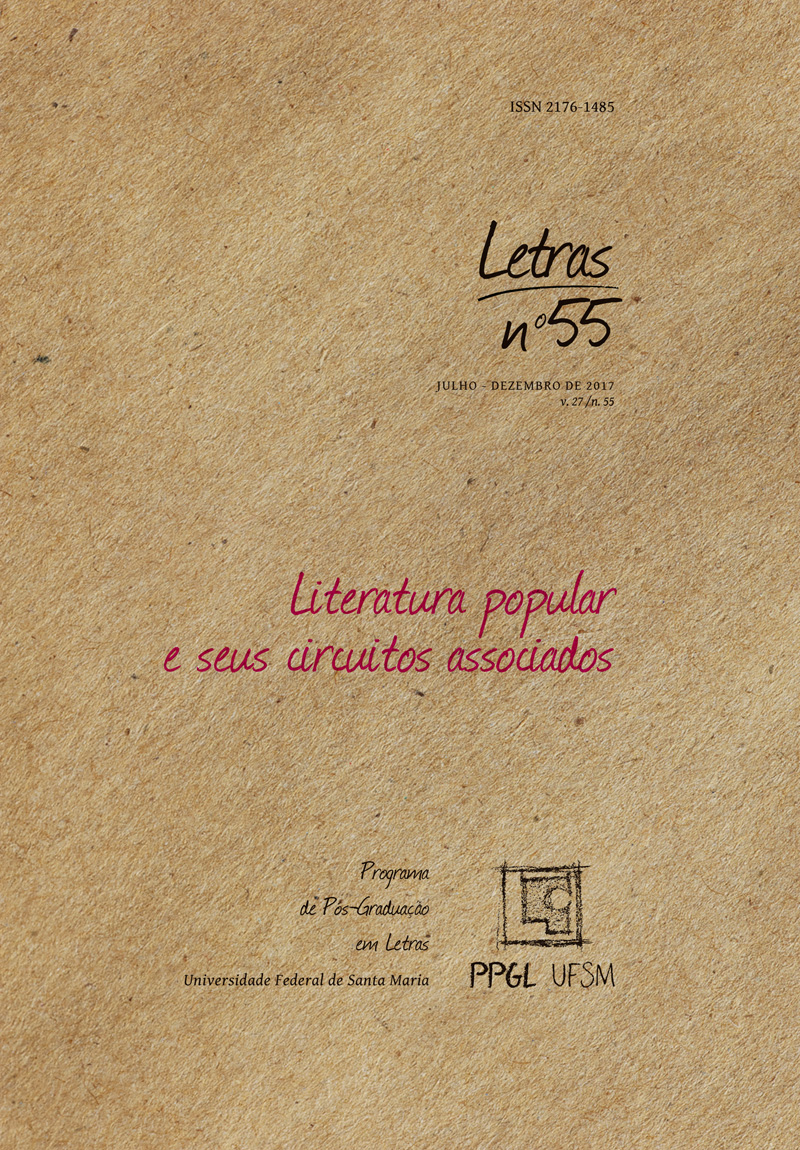The Presence of Death in the Portuguese oral tradition of children’s poetry
DOI:
https://doi.org/10.5902/2176148529406Keywords:
death, oral tradition, portuguese cancioneiro, nursery rhymes.Abstract
In Western countries, we are often reminded, from time to time, of our growing inability to confront death with resolve and dignity. There is a common assumption that but to speak of death is to produce pain and discomfort, emotions that are blatantly incompatible to the predominant standard patterns of felling of our modern societies, as the cultivation of beauty and the ideal of eternal youth. At least until the decades of 1870 and 1880, the Portuguese society - particularly the one that was still living in the countryside – had a much less restrictive standing towards death and the realities of aging and disease. Today, these topics and themes are thought mostly as inappropriate and, as a result, an increasing number of children are nowadays raised in total unawareness of death. Our investigation will examine the presence of the death theme in modern and contemporary oral children poetry in Portugal. We will examine, in particular, whether death appears more as a character or as an event in these stories, and reflect as well on its types and its semantic, symbolic and pragmatic scope. We will finally consider the possibility of integrating these texts into the context of learning and schooling.Downloads
References
BRAGA, Teófilo (1985): “A linguagem emocional. Parlendas e jogos infantis”. O povo português nos seus costumes, crenças e tradições. Vol. I.
BRANCO. Lisboa: Publicações Dom Quixote, pp. 209-273.
Coelho, Adolfo (1999): Contos populares portugueses. 5.ª ed. Lisboa: Publicações Dom Quixote.
FREUD, Sigmund (1917): “Trauer und melancholie“ (1915). Internationale zeitschrift für ärztliche psychoanalyse, IV, 6, pp. 288-301.
GOODALL, Janet (2000): “Grieving parents, grieving children”. In: AVERY, Gillian; REYNOLDS, Kimberley ed. Representations of childhood death. Hampshire and London / New York: Macmillan Press / St. Martin’s Press, pp. 225-238.
GUIMARÃES, Ana Paula (2004): “A história das histórias: a carochinha”. In: GUIMARÃES, Ana Paula, BARBOSA João L. FONSECA, Luís Cancela (orgs.). Falas da Terra. Natureza e ambiente na tradição popular portuguesa. Lisboa: Edições Colibri / Instituto de Estudos de Literatura Tradicional, pp. 395-417.
MATA, Lília & PINTO, Carolina (2009): “História da carochinha em verso”. Uxy. Web. 31 July 2012.
LIMA, Augusto César Pires de (1994): O livro das adivinhas. 7.ª ed. Lisboa: Editorial Notícias.
MOUTINHO, Viale (1990): Adivinhas populares portuguesas.2.ª ed. revista e aumentada. Porto: Editorial Domingos Barreira.
NOGUEIRA, Carlos (2002): Cancioneiro popular de Baião. Vol. II. Baião: Cooperativa Cultural de Baião – Fonte do Mel.
NOGUEIRA, Carlos (2012): “Death in literature for children and young people”. Portuguese Studies, 28, pp. 93-111.
OLIVEIRA, José Alberto (2004): O bestiário. Lisboa: Assírio & Alvim.
PARAFITA Alexandre (2001): Antologia de contos populares. Vol. I. Posfácio de Ana Paula Guimarães. Lisboa: Plátano Editora.
SALGUEIRO, Tiago (2009): Trava-línguas e mais adivinhas coloridas. Ilustrações de Elsa Navarro. Porto: Ambar.
SOARES, Luísa Ducla (recolha e selecção) (1994): Adivinhas, adivinhas. 150 adivinhas populares. Ilustrações de Sofia Lucas. 3.ª ed. Lisboa: Livros Horizonte.
SOARES, Luísa Ducla (recolha e selecção) (1997): Lenga lengas. Ilustrações de Sofia Castro. 2.ª ed. Lisboa: Livros Horizonte.
TRESMONTANT, Claude (1966): Comment se pose aujourd’hui le problème de l’existence de Dieu?Paris: Seuil.
Parafita, Alexandre (2001): Antologia de contos populares. Vol. I. Lisboa, Plátano Editora.
VASCONCELOS, José Leite de (1963): Contos populares e lendas.Coordenação de Alda da Silva Soromenho e Paulo Caratão Soromenho. Vol. I. Coimbra: Por Ordem da Universidade.







